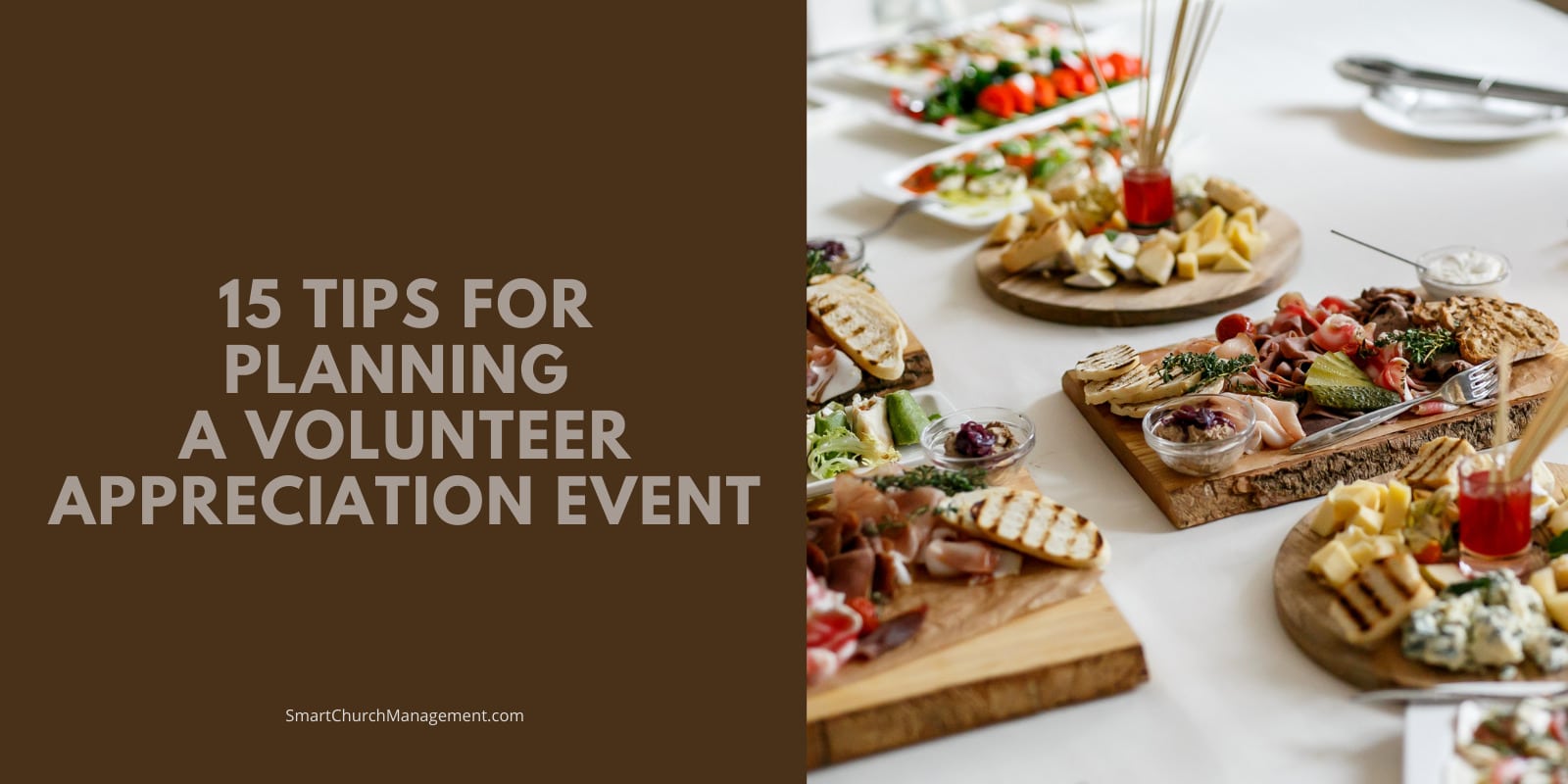
What would the church do without its faithful volunteers?
Volunteers are the labor engine of a church, and most churches would not exist without this free labor force.
The Covid pandemic has been tough for everyone.
But the church goes on. There are jobs that need to get done, and thankfully there are faithful volunteers who have helped so many churches maintain during this challenging time.
Life is slowly getting back to a new normal, and now might be a good time to think about saying thank you to your faithful volunteers.
Planning events to show appreciation to volunteers can be fun and rewarding.
The trick is to be strategic and organized in the planning and delivery.
Whether you are planning a training event, an appreciation dinner, new volunteer orientation, or a volunteer recruitment fair – the model should include the same basic planning elements.
It takes a team to pull off a successful event.
Successful event planning includes identifying a team of people who can help with all of the logistical aspects of the event and using an event planning template.
Try to identify at least four or five people to share the responsibility. This team will make the planning and execution of the event easier and more manageable.
When selecting team members, look for people who not only have a passion for the event but also individuals who can help to add a creative flair to the occasion.
Creative people think of the small details that can help take an event from ordinary to extraordinary – so try to capture those creative juices and take advantage of them!
It is really important to begin any planning with an event budget. Make sure someone authorizes spending for the event and allocates budget dollars.
Plan it on a cost-per-person model which will help you to keep costs under control.
For example, if the budget allows for $10 per person, the team needs to determine how that $10 will be divided among all of the planning elements of food, marketing, decor, AV support, gifts, etc.
| Budget Item | Cost Per Person |
|---|---|
| Food | $4 |
| Marketing | $1 |
| Decorations | $1 |
| AV Support | $1 |
| Gift | $2 |
| Miscellaneous | $1 |
| Total Cost Per Person | $1 0 |
So in this example budget, an event that hosts 100 people will have a budget of $1,000.
| Budget Item | Event Budget |
|---|---|
| Food | $400 |
| Marketing | $100 |
| Decorations | $1 00 |
| AV Support | $1 00 |
| Gift | $200 |
| Miscellaneous | $1 00 |
| Total Event Cost | $1 000 |
3. Establish An Event Goal
The first thing a planning team needs to determine is the event goal. An event goal simply states what it hopes to achieve by hosting this event.
Ask yourselves – Is the goal of this event to show appreciation, educate, sell an opportunity, or encourage faithful volunteers?
Whatever the focus, it is important to have a clearly stated goal for the planning committee that is considered throughout the entire planning process.
Keeping an end goal in mind will help to dictate activities and agendas to meet the goal requirements.
Every event should have a theme. A well-thought-out theme will help to determine the creative elements of the event.
For example, if the theme is Summer Fun, the creative elements may be things that are associated with summer.
Creative elements might include things like ice cream, BBQ, Corn on the Cob, etc. The theme also influences any graphics and decorations for the event.
In the example of summer fun, graphics may include ice cream cones, sunglasses, chaise lounges, etc.
The creative graphics will help to get people excited about participating in the event.
After the theme is determined, you can incorporate a graphic description of the theme into printed materials that will be used to market the event.
Printed materials, such as flyers, banners, or invitations, are all things that the theme would naturally flow through.
The goal of these materials is to incorporate them into a marketing plan that is used to communicate that the event is happening and to get people interested in attending.
People are naturally drawn to food, so incorporate food and beverages into the event.
The food menu should reinforce the theme in the food selection as well as the paper products and the way the food is displayed.
For instance, if the theme is summer fun, the food table may be decorated with summer-themed paper products and decorations.
Events seem more fun when there are decorations that reinforce the theme.
The decor can be incorporated into how tables are decorated, how the food is displayed, or how a room is arranged.
It doesn’t really matter. It just matters that a creative element is used for the event.
Tablecloths, centerpieces, and decorations can help to set the tone for the event.
Any event that involves food should require an RSVP process so you can safely predict the number of people who will be in attendance and how much food and drink will be needed.
Ask people to RSVP and keep an attendance list to help with this.

Use the marketing materials to give instructions for how guests will RSVP.
Have a sign-in sheet so you can keep track of who attended the event.
This attendance sheet will also help you compare the RSVP list with those that actually attended.
Background music sets the mood for an event, so it is important to select music that communicates the feel of the event.
Upbeat music gets people excited and engaged, while slower music is more relaxing and subtle.
Take some time to determine the tone and feel you would like the event to have.
Most events have some sort of speaker element and require audio/video support.
Whether it is someone welcoming the guests or a video thanking the group – planning for that AV support is important.
It is also critical to test all equipment before guests arrive to ensure it is working properly.
The last thing you want is a red-faced presenter who couldn’t get the mic to work.
Every event should have an agenda that includes set-up times, event activity times, speaker times, event closing, and clean-up.
| 8:00 – 11:00 am | Food Preparation |
| 10:00 – 12:00 pm | Set-up/Decorations |
| 12:00 pm | Welcome |
| 12:10 pm | Guest Speaker |
| 12:45 pm | Lunch |
| 1:30 pm | Awards |
| 1:50 pm | Closing Remarks |
| 2:00 pm | Dismissal |
| 2:30 – 4:00 pm | Clean-up |
Sometimes, it’s appropriate to include a thank you gift in the event.
This would be appropriate for special occasions such as an appreciation event.
In this case, it is important to have budget dollars for the gift and ample time to select and order a gift to ensure it arrives on time with a little added time for wrapping.
Make sure you include the cost of wrapping in the gift budget.
Every event requires a team to set it up and a team to tear it down, and clean up afterward.
The trick is recruiting enough people to help so that it does not fall on the shoulders of just one person.
There is nothing more discouraging than one single person trying to clean up after an event long after everyone has gone home.
Try to recruit a team to help and always, always have some upbeat music playing in the background to help keep energy levels up.
The planning team should determine what kinds of supplies will be needed on the day of the event and assign someone to make sure they are available.
Supplies might include things like name tags, pens, markers, staplers, flip charts, whiteboards, etc. are all examples of possible supplies.
Organize supplies by area of need.
For instance, the registration desk may need pens, markers, and name tags.
Provide the necessary supplies so that on the day of the event, you are not scrambling to find a marker!
Planning teams do a lot and appreciate when hard work is acknowledged in the way of a sincere thank you.
Send an email or handwritten note to everyone on the planning committee. Invest this time to thank them for their time commitment and the effort they put forth to make the event happen.
There is so much work behind the scenes of an event, and the planning team does it because they love to – however, everyone appreciates being thanked for their hard work.
Volunteer appreciation events are lots of fun to host but the trick to successful events is a great team that plans a lot of detail and is able to facilitate all of the planning elements into a great event!
If you are a member of SCM you can log in to your account here to access editable copies of an event planning template and budget form.
If you are not a member and would like access to editable copies of these documents, you can learn more here.

Patricia Lotich is a Certified Manager of Quality and Organizational Excellence through the American Society for Quality and is the author of Smart Church Management: A Quality Approach to Church Administration.
She helps churches fulfill their mission by managing their resources of - people, time and money.